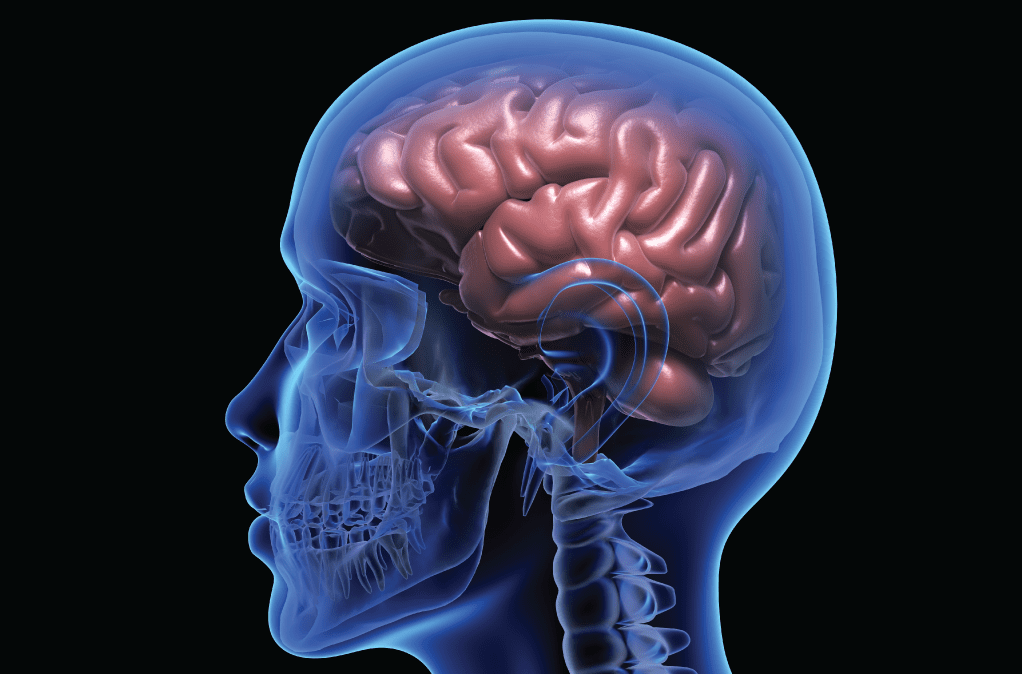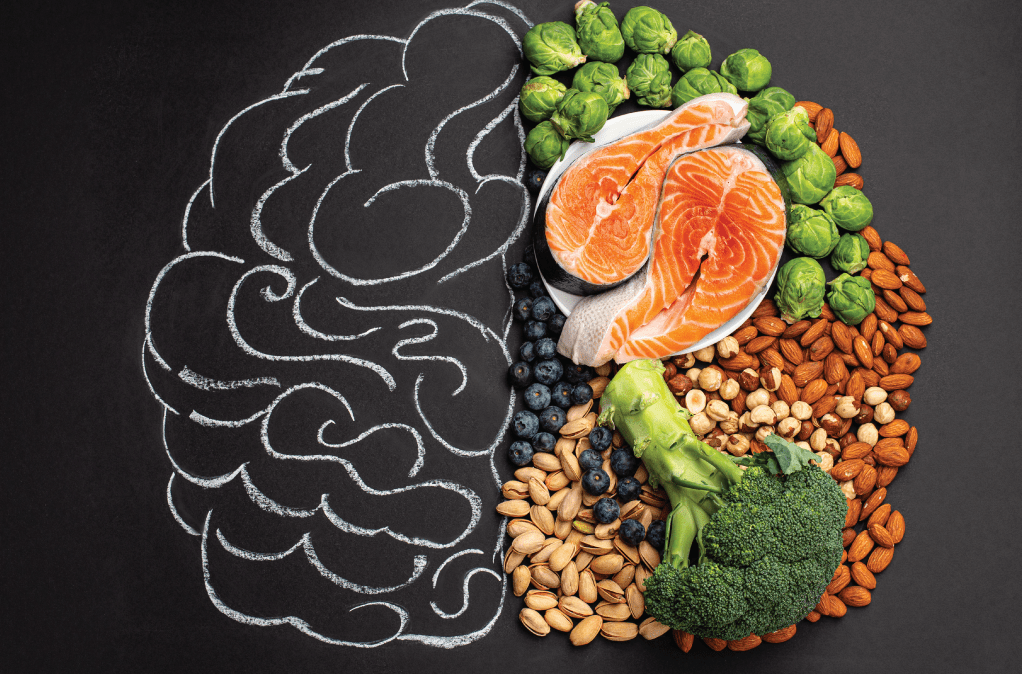Table of Contents
What is “neuroplasticity?” It’s a term that keeps sprouting up in our collective vocabulary, from fashion magazines to business courses at MIT. But what is it, and why is it so important? Simply put, neuroplasticity is the brain’s ability to grow and adapt over time. By creating new neurons and building new neural networks, our brains are able to rise to the challenges of personal and environmental stressors and age. Below are five of the most important, concrete ways we can protect and enrich our brains with active care, from food choices to supplements. [This article, “[This article, “Recipe For A Healthier Brain: 5 Key Ingredients” was originally published in NewsHealthWatch]”
Food for thought For A Healthier Brain
Adopting a brain healthy eating style has been shown to slow brain aging by 7.5 years and to lessen the chances of developing Alzheimer’s disease. The Mayo Clinic recommends what it calls the MIND diet — a hybrid of the heart-healthy Mediterranean diet and the blood pressure-reducing DASH diet — which incorporates much less red meat and salt than a typical American diet, and emphasizes plant-based foods, whole grains, fish and healthy fats. Rich in anti-oxidants, vitamins, and minerals, these “brain foods” help the mind process new information and produce hormones such as dopamine that increase alertness and attention span.
Salmon
Salmon is very high in omega-3 fatty acids, which increase cerebral circulation and keep dopamine levels in the brain active. They also increase mental focus and slow cognitive decline in older adults by supporting the frontoparietal region, the part of the brain known for problem-solving, Researchers also say that people age 65 and older who generally ate fish once a week or more scored better on memory tests and number games than those who had seafood less often.
Pumpkin Seeds
Nuts are packed with fat-soluble vitamin E, known for its brain-protective qualities. Pumpkin seeds also provide over 70 percent of the recommended daily allowance of zinc, which improves communication between neurons and may help reduce memory loss.
Oranges
Oranges are rich in vitamin C, a powerful antioxidant that fights off free radicals that can damage brain cells. A 2017 study showed that healthy young adults who drank orange juice had greater blood flow to the brain; eating one medium orange every day could improve focus, attention, and decision speed.
Blueberries
Rich in flavonoids, blueberries have one of the highest antioxidant levels of any food. In a 20-year study of over 16,000 older adults, those who ate the most blueberries and strawberries had the slowest rates of cognitive decline. Blueberries also are a rich source of vitamin K, which regulates calcium in the brain.
Leafy greens
Greens like kale, collards and spinach are packed with folate, vitamin E, carotenoids and flavonoids, which have been shown to lower the risk of dementia and cognitive decline. The iron and vitamin B6 in kale also work with these nutrients to help the brain produce healthy levels of the neurotransmitters serotonin and dopamine, which regulate mood.
Lamb
A long-term study found that weekly consumption of lamb instead of other red meats improved long-term cognitive abilities. Lamb contains vitamin B12, zinc, selenium, niacin, and heme iron, the type absorbed more efficiently by the body than in plants. It is also rich in high-quality protein: around 25 grams per 3.5-ounce serving. (Red meat makes an appearance fewer than four times a week in the ideal MIND diet. Beans, lentils and soybeans, full of protein and fiber, make a good substitute.)
Brain exercise
Staying mentally active helps support brain health in a number of ways, including maintainance of memory, cognition, and creativity. A variety of activities can help to “cross-train” the mind, from doing crossword puzzles or Sudoku to reading or putting together a jigsaw puzzle. Incorporating different activities can increase their effectiveness. Here are a few to try.
The ‘Memory Palace’ is an ancient Greek and Roman technique for memorizing difficult things like lists of names, by mapping them onto memorable imagery, coming up with a story about the thing you’re trying to remember, or perhaps making it into a song that rhymes or has some cadence.
Try getting dressed with your eyes closed or eating your food with the non-dominant hand.
The Alzheimer’s Society says that playing card games can help fight the disease.
Spend 15 minutes per day of acquiring a new skill or mastering an old one.
Use your motor skills when learning something new.

Sleep Is Key For A Healthier Brain
Adequate sleep is critical to brain health. Some theories posit that sleep helps clear abnormal proteins and lipids in the brain such as lipofuscins; it also consolidates short-term into long-term memories, which boosts brain function and overall memory. Without proper sleep, the brain becomes foggy and has a harder time absorbing and recalling new information. Reduced alertness and attention problems are common; judgment is poor, and fine motor skills are impaired. Chronic sleep deprivation can also lead to serious health conditions, such as heart failure, high blood pressure, diabetes, and stroke. Seven to eight consecutive hours of sleep is necessary for most people, not fragmented sleep of two- or three- hour increments.
For those having trouble sleeping, keeping the bedroom cool and dark may help. Others try progressive relaxation, warm baths, or aromatherapy.
Others reach for over-the-counter supplements of melatonin, a naturally produced sleep hormone; last year, more than 3 million Americans used melatonin supplements to fall asleep. Increasingly though, consumers have been finding relief with supplements of tryptophan, an essential amino acid that is a precursor to both melatonin and serotonin.
One such product is DELTA BRAINLUXURY™, a nutritional brain supplement designed to improve sleep quality by using the essential amino acid tryptophan to stimulate the body’s natural production of both melatonin and serotonin, a neurotransmitter that plays an important role in feeling energized and motivated in the morning.
“We just give the starting material, and then your brain decides what it needs,” says biochemist Dr. Axel Bouchon, co-founder of BRAINLUXURY™, a New York-based company started in 2021 with co-founder and CEO Hermann Schützinger.
DELTA BRAINLUXURY™, a combination of tryptophan, glycine (an amino acid that supports serotonin production), omega-3 fatty acids and vitamins, is not a sleeping agent; it instead provides nutrition necessary for an intensified deep sleep period. According to Bouchon “the brain is 70% fat, so you obviously need oil to feed such a fatty organ.” That’s why the patent pending formula is includes a unique combination of essential oils, which Bouchon says “open a much faster delivery to your brain.”
“Don’t touch melatonin,” says Bouchon, “use your own. There is a natural alternative – and it is us.”

Movement
Experts recommend that people try to stay on their feet as much as possible. A 2018 study found that adults ages 45 to 75 who sat at least three hours a day had substantial thinning of their medial temporal lobe, a part of the brain responsible for the formation of new memories. This thinning is usually a precursor to dementia.
Regular aerobic exercise — any moderate aerobic activity that increases your heart rate — boosts blood flow to the brain, and also boosts the size of the hippocampus, the part of the brain that’s involved in verbal memory and learning. It also tends to counter some of the natural reduction in brain connections that occur during aging. Multiple research studies also show that people who are physically active have a lower risk of developing Alzheimer’s disease.
One 2017 study found an association between low physical activity and dementia risk. The researchers also did MRI scans of about 2,000 people 60? or older and found that the more active they were, the larger their hippocampus. The protective effects were highest in those over age 75, adding more evidence that it’s never too late to start. Here are some good places to begin.
Dancing
A New England Journal of Medicine study followed seniors for more than 20 years and found that regular dancing reduced the risk of dementia by 76 percent — twice as much as reading.
Yoga
A 2016 UCLA study found that people 55? or older who enrolled in a 12-week program consisting of an hour of a type of meditative yoga once a week as well as ?12 minutes of at-home meditation had significant improvements in both verbal memory and visual-spatial memory. The changes occur when practicing unfamiliar movements, because learning new skills creates new neural pathways.
Tai chi
According to a 2018 study, older adults who practiced tai chi for 12 weeks had a greater ability to multitask,. They also had more activity in the prefrontal cortex, the part of the brain where higher-level thinking occurs. Additional studies suggest that tai chi can help improve reasoning, planning, problem-solving and memory among older adults without evidence of significant cognitive impairment.
It’s never too late to start,” says Kaitlin Casaletto, an assistant professor of neuropsychology at the University of California, San Francisco. “Greater physical activity is associated with more synaptic protein levels in brain tissue, and this suggests that every movement counts when it comes to brain health.”
Social Activity
Research shows that interacting with others supports brain cell production and repair – but this goes beyond ‘likes’ on social media. It’s important to connect with loved ones and friends, especially if you live alone. There is research that links living a solitary life to brain atrophy — so remaining involved with other people may have the opposite effect and strengthen brain health.
Hearing
There’s also direct connection between hearing and preserving cognitive function: hearing loss presents the largest identifiable risk for developing dementia, exceeding social isolation, smoking, high blood pressure, and lack of exercise. According to The Lancet, those with only slightly poorer hearing than normal can experience cognitive deficits. That’s because when the brain is inadequately stimulated by aural input, it tends to atrophy.
The best way to prevent hearing loss is to protect the ears against noise. The effects of noise exposure are cumulative, so avoid listening to loud music for extensive periods of time. If you listen through earbuds or headphones, try to get ones with a noise-canceling feature that blocks ambient sound. This allows you to listen to programs and music at lower volumes that are less damaging to hearing.
An arsenal of techniques can individualize efforts to improve brain health, from personal choices in diet, movement, brain games, social activities, to good sleep hygiene. And companies like BRAINLUXURY™ are beginning efforts to personalize their products. The ultimate goal of BRAINLUXURY™ is to understand individual customer sleep patterns and recommend tailored usage of products based on each client’s specific needs.
Brain health is literally steps away, depending upon where your feet decide to go, how you occupy your hands, who you spend time with, and how you fill your plate. Stimulating all your senses, from taste and hearing to touch and kinetic motion and rest will complete your own recipe for how to keep your brain active and fit for some time to come. Happy hunting!
Help Links:
https://www.health.harvard.edu/mind-and-mood/12-ways-to-keep-your-brain-young
Disclaimer
Important Note: The information contained in this article is for general informational purposes only and should not be construed as health or medical advice, nor is it intended to diagnose, prevent, treat, or cure any disease or health condition. Before embarking on any diet or program of nutritional supplementation, it is advisable to consult your healthcare professional in order to determine its safety and probable efficacy in terms of your individual state of health.
[This article, “Betting on Clean Energy… And Clean Nutrition For Our Bodies” was originally published in NewsHealthWatch]

